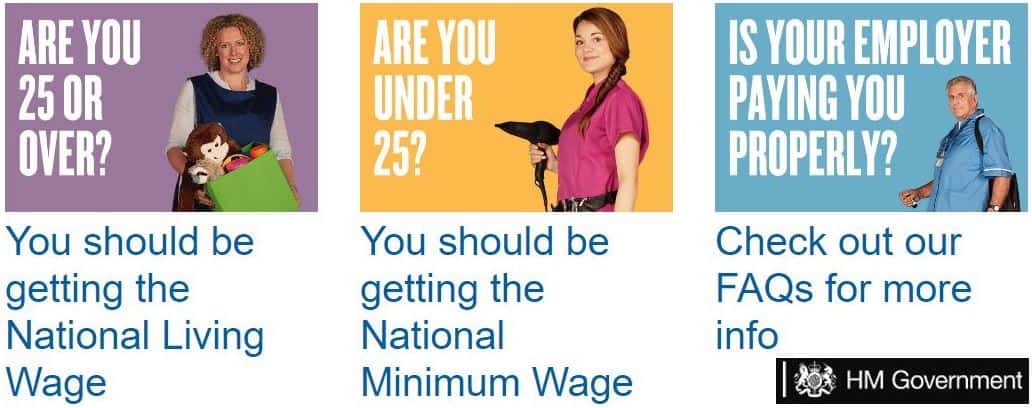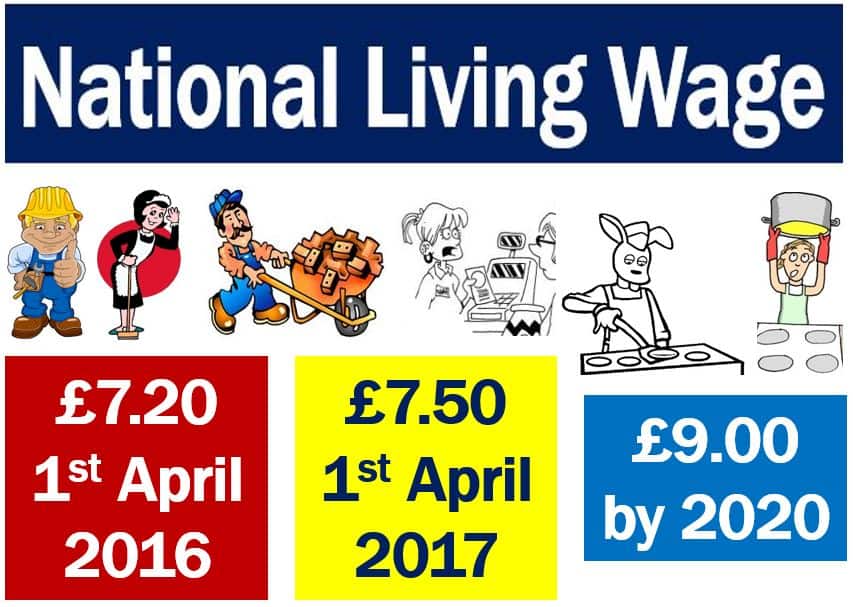The National Living Wage rises from £7.20 to £7.50 per hour. This means that workers aged 25+ on minimum pay in the UK will get a 4% pay hike today.
A low-paid full-time worker aged 25+ will see his or her annual income increase by nearly £600. However, groups representing businesses have warned that many commercial enterprises may have to raise prices to cover the additional labour cost.
The incomes of the rest of the British labour force are failing to keep up with cost of living increases.
 If you are 25+ years of age you should be receiving the National Living Wage. If you are under 25 you should be getting the National Minimum Wage. (Image: checkyourpay.campaign.gov.uk)
If you are 25+ years of age you should be receiving the National Living Wage. If you are under 25 you should be getting the National Minimum Wage. (Image: checkyourpay.campaign.gov.uk)
CheckYourPay.Campaign.gov.uk has the following information on its homepage:
“If you are a worker aged 25 and over, and not in your first year of an apprenticeship, you are legally entitled to at least the National Living Wage. Until 31 March 2017, this is set at £7.20 per hour. From 1 April 2017, it will go up to £7.50 per hour.”
“If you currently earn less than £7.50 per hour, you should automatically see an increase in your pay after 1 April 2017. It is illegal for your employer to pay you below the National Living Wage, so check your pay and talk to your manager to make sure you’re getting what you are entitled to.”
National Living Wage
The National Living Wage, which applies to workers in Britain aged 25 or more, came into force exactly one year ago today. On April 1st, 2016, over two million British workers saw their hourly pay rate rise significantly.
Workers aged from 21 to 24 years, as well as apprentices, are entitled to at least the National Minimum Wage, which started in 1999. The National Minimum Wage goes up by 5p or 10p per hour – depending on the employee’s age.
 Before 1999, there was no national minimum wage in the United Kingdom. (Image: adapted from checkyourpay.campaign.gov.uk)
Before 1999, there was no national minimum wage in the United Kingdom. (Image: adapted from checkyourpay.campaign.gov.uk)
While those on the National Living Wage got a 4% hike today, 21 to 24-year-old National Minimum Wage earners will receive a rise of only 1.4%, while their 18-to-20-year-old counterparts will get a meager 1% increase. However, the National Minimum Wage did rise considerably in October 2016.
National Living Wage and business costs
When the National Minimum Wage and the National Living Wage were first introduced, Britain’s business community voiced concerns that the additional costs would result in higher unemployment.
However, a 2016 Report by the Low Pay Commission found ‘no clear evidence’ of higher minimum wages adversely affecting employment.
In fact, some sectors with a high percentage of low-paid employees – including horticulture, cleaning and retail – reported significant rises in employment.
Not being paid enough?
If you think you are not being paid the right amount, the British Government says you should talk to you manager. “If you have been underpaid, your employer owes you back pay. Make sure you get what you’re owed,” it adds.
For those who feel uncomfortable talking to their manager, there is an Acas helpline – a) Telephone: 0300 123 1100. b) Acas online helpline – for confidential support and advice.
 The aim is to have a National Living Wage of at least £9.00 per hour by the end of this decade.
The aim is to have a National Living Wage of at least £9.00 per hour by the end of this decade.
Acas provides confidential advice, free of charge, to employers, workers, and their representatives on employment rights, policies, and best practices.
The helpline has a translation service for more than 100 languages (also free of charge).
Video – National Living Wage
In this Financial Times video, which was published one year ago, Sarah O’Connor assesses the impact of the National Living Wage on low-paid workers and their employers in the cleaning and hotel sectors.

